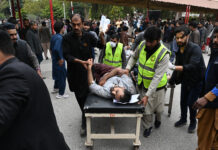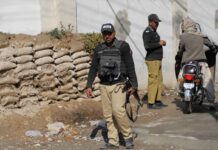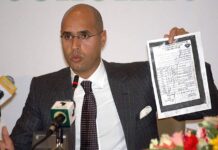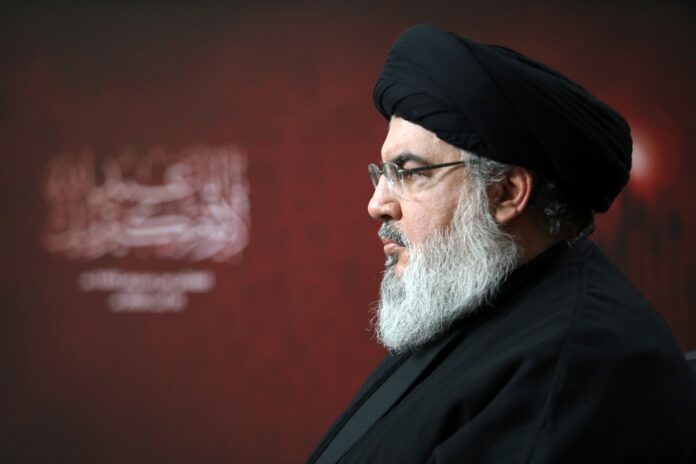
The Israeli army on Saturday claimed the “liquidation” of Hezbollah leader Hassan Nasrallah in a recent airstrike on Beirut’s southern suburb.
In a statement on X, Israeli army spokesman Avichay Adraee said Nasrallah was ‘liquidated’ during an operation targeting the central command of Hezbollah located beneath a residential building in the southern suburbs of Beirut.
Adraee explained the airstrike was conducted with “precise intelligence from the military’s intelligence agency,” targeting a location where Hezbollah’s leadership was reportedly coordinating attacks against Israel.
He added that the operation also resulted in the deaths of Ali Karki, the leader of Hezbollah’s southern front, and several other Hezbollah commanders.
Israel has pounded Lebanon since early Monday with strikes that have killed more than 700 victims and injured nearly 2,200, according to figures released by the Lebanese Health Ministry.
The ministry also said that the death toll in Lebanon since last October is 1,540, in addition to the more than 77,000 displaced from the southern and eastern parts of the country.
Hezbollah confirmed Nasrallah’s death earlier today.
Subscribe to our newsletter and stay updated on the latest news and updates from around the Muslim world!
“His Eminence Sayyed Hassan Nasrallah, Secretary-General of Hezbollah, has joined his great, immortal martyr comrades whose path he led for nearly thirty years, guiding them from victory to victory. He succeeded the Master of Martyrs of the Islamic Resistance in 1992 until the liberation of Lebanon in 2000 and to the glorious divine victory in 2006 and all the battles of honor and sacrifice, arriving at the battle of support and heroism in support of Palestine, Gaza, and the oppressed Palestinian people.
“We offer our condolences to the Master of the Age (may Allah hasten his reappearance), the Guardian of the Muslims, Imam Sayyed Ali Khamenei, may his shadow endure, the esteemed scholars, the fighters, the believers, the nation of resistance, our patient and struggling Lebanese people, the entire Islamic nation, all the free and oppressed people in the world, and his honorable and patient family.
We congratulate His Eminence, the Secretary-General of Hezbollah, Sayyed Hassan Nasrallah, may Allah be pleased with him, on receiving the highest divine medals, the medal of Imam Hussein (peace be upon him), fulfilling his most precious wishes and the highest ranks of faith and pure belief, as a martyr on the path to Al-Quds and Palestine. We also offer our condolences and congratulations to his fellow martyrs who joined his pure and sacred procession following the treacherous zionist raid on the southern suburb.
“The leadership of Hezbollah pledges to the most exalted, sacred, and precious martyr in our journey, full of sacrifices and martyrs, to continue its jihad in confronting the enemy, supporting Gaza and Palestine, and defending Lebanon and its steadfast and honorable people.
“To the honorable fighters and the victorious and triumphant heroes of the Islamic Resistance, you are the trust of the martyred Sayyed, his brothers who were his fortified shield and the crown jewel of heroism and sacrifice. Our leader, His Eminence, the Sayyed, remains among us with his thought, spirit, path, and sacred approach. You remain bound to the covenant of loyalty and commitment to resistance and sacrifice until victory.”
Who is Hassan Nasrallah?
Hassan Nasrallah was born on Aug. 31, 1960, in the village of Bazouriyeh, near Tyre in southern Lebanon.
He is married to Fatima Yassin, and they have five children: Hadi, Zeinab, Mohammad Jawad, Mohammad Mahdi, and Mohammad Ali.

His eldest, Hadi, was killed in clashes with the Israeli army in southern Lebanon in 1997.
Nasrallah received a religious education at Shia Muslim seminaries in Lebanon, Iraq, and Iran. He joined the political Amal Movement in high school and rose to its political bureau in 1979.
In 1982, amid disagreements over how to resist Israel’s invasion of Lebanon, Nasrallah and others left Amal and joined Hezbollah, a newly formed group. He was put in charge of mobilizing fighters in the country’s Bekaa Valley.
By 1985, Nasrallah moved to the capital Beirut and became deputy head of the region. Later, he assumed the role of chief executive, tasked with implementing the decisions of the group’s Shura Council.
Leadership of Hezbollah
Nasrallah became Hezbollah’s secretary-general on Feb. 16, 1992, following the assassination of his predecessor Abbas al-Musawi in an Israeli airstrike.
Under Nasrallah’s leadership, Hezbollah launched a series of strategic operations against Israel, culminating in the withdrawal of Israeli forces from southern Lebanon in 2000 after a 22-year occupation.
In 2004, he played a key role in negotiating a major prisoner exchange with Israel, leading to the release of hundreds of Lebanese and Arab prisoners.
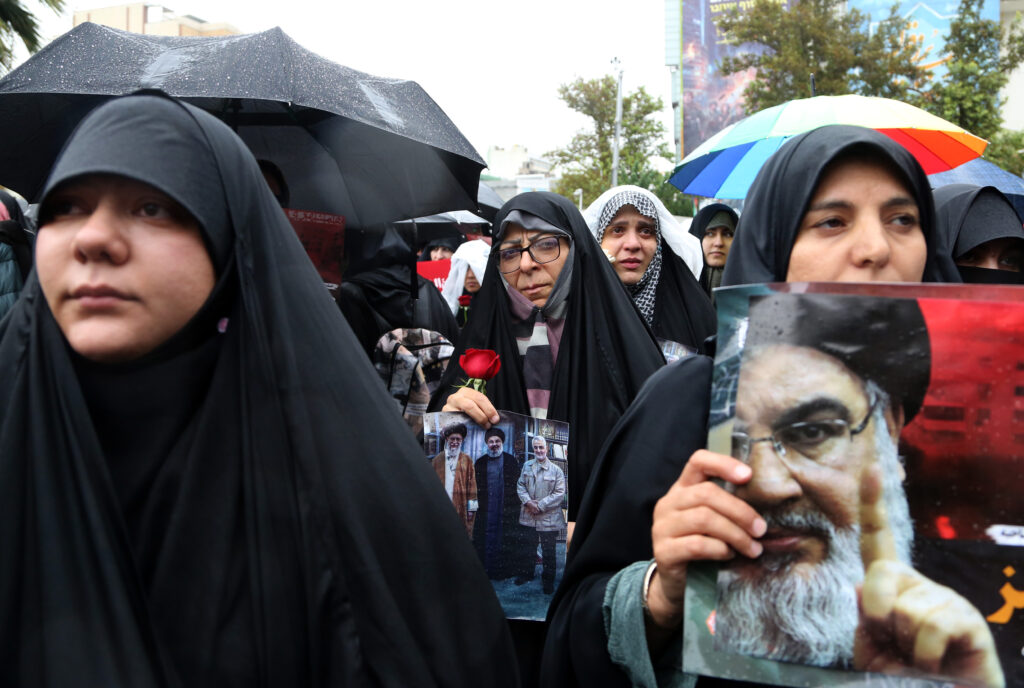
His role in securing Israel’s withdrawal from southern Lebanon locally earned him the title “leader of the resistance,” especially after Hezbollah’s later confrontation with Israel during the 2006 Lebanon War.
Fiery speeches and his commitment to retaliating against Israeli attacks, particularly in defense of Palestinians, further bolstered his popularity across the Arab and Islamic worlds.
However, Nasrallah’s popularity diminished over Hezbollah’s support for the Syrian regime against opposition forces during Syria’s ongoing civil war, which broke out in 2011.
His standing rebounded in the wake of the “Al-Aqsa Flood” operation launched by Palestinian factions, including Hamas and Islamic Jihad, against Israeli settlements near Gaza on Oct. 7, 2023.
Israel’s Gaza offensive, now nearing its first anniversary, has resulted in over 137,000 Palestinian casualties.
Nasrallah declared the opening of a “front in southern Lebanon to support Palestinian resistance,” vowing in several speeches that the effort would remain active until the war in Gaza ends.
His killing comes as France and the US step up efforts to broker a temporary 21-day cease-fire between Israel and Hezbollah, aiming to pave the way for diplomatic solutions on both the fronts in Lebanon and Gaza.









